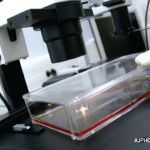
Image Credit: Petr Vaclavek/shutterstock.com
SAN FRANCISCO—Metabolomics could one day be a treasure map of information about inflammation in rheumatic disease. There are many metabolic pathways to pursue for clues on how to reverse this damaging process. “All of these signaling pathways are interrelated and affect each other,” said Douglas J. Veale, MD, director of translational research at Dublin Academic Medical Centre and a consulting rheumatologist at St. Vincent’s Hospital in Dublin, Ireland. “No one, single signaling pathway is responsible for inflammation.”
Dr. Veale was one of a panel of speakers who delved into metabolomics’ role in inflammatory arthritis at the 2015 ACR/ARHP Annual Meeting on Nov. 7, 2015. Topics included glycolysis, hypoxia and metabolomics’ role in both acute and chronic inflammation. Researchers are keen to learn more about how manipulating cell metabolism may, in the future, facilitate the development of more effective therapies.
Glucose Metabolism
“Metabolic reprogramming of cells is essential to support immune function,” explained Jeffrey Rathmell, PhD, associate professor of pharmacology, cancer biology, and immunology at the Duke University School of Medicine in Durham, N.C. Many therapies for autoimmune disorders are metabolic inhibitors, he said.
One important metabolic pathway is glycolysis, Dr. Rathmell said. T lymphocytes that drive autoimmunity produce energy through metabolism and require glucose as fuel.
“Why do cells go through the change from an oxidative state then to aerobic glycolysis?” Cancer cells especially go through aerobic glycolysis, a process that includes increased uptake of glucose. “And it’s not just glucose. T cell activation also broadly reshapes the metabolome,” Dr. Rathmell said. T cell stimulation strongly upregulates this glucose uptake.
It’s still unclear how glycolysis affects cell survival, but one area of research is the glucose transporter family, especially GLUT1, said Dr. Rathmell. Cells need GLUT1 to proliferate normally. GLUT1 is rapidly induced and requires activation of the PI3-kinase pathway. It promotes human T cell growth and proliferation, and CD4 T cells will go on to differentiate into metabolically distinct effector or regulatory subsets that play a role in the inflammatory response.1 Each subset has different characteristics, and glycolysis is highest in Th1 and Th17.
T-regulatory and T-effector cells rely on distinct metabolic mechanisms, and Glut1 plays an important role in these processes, he said. Induced T-effector, but not T-regulatory, cells are affected by a deficiency of Glut1. T cells require Glut1 for the production and expansion of inflammatory cytokines in inflammatory bowel disease, for example.


